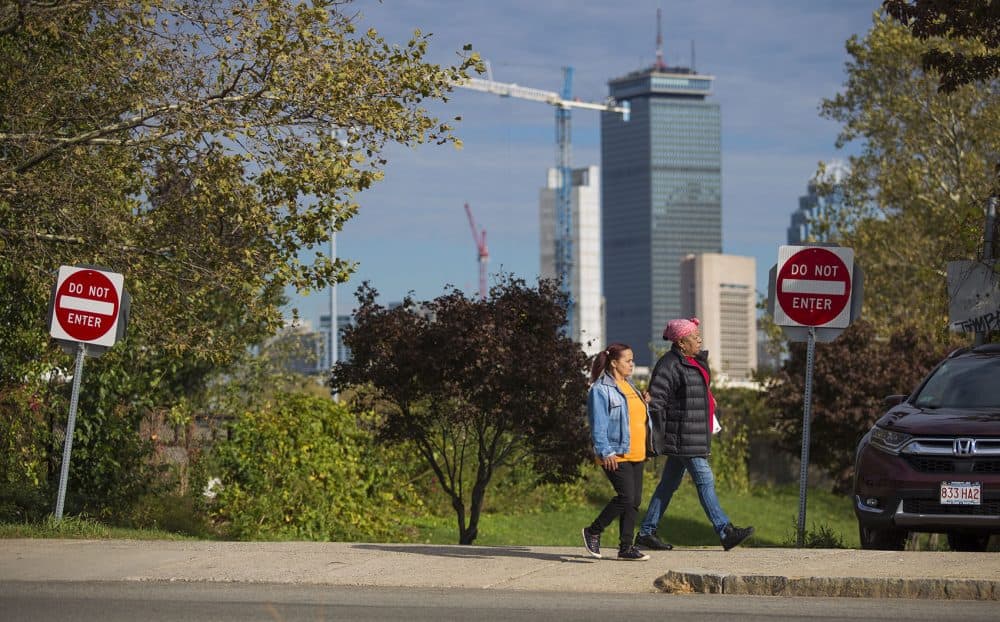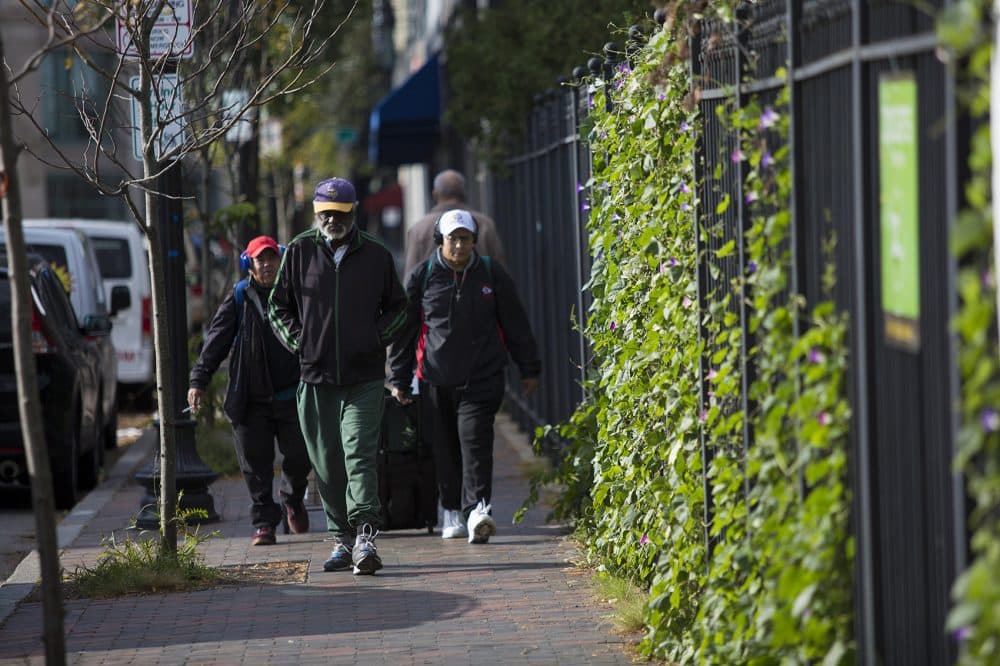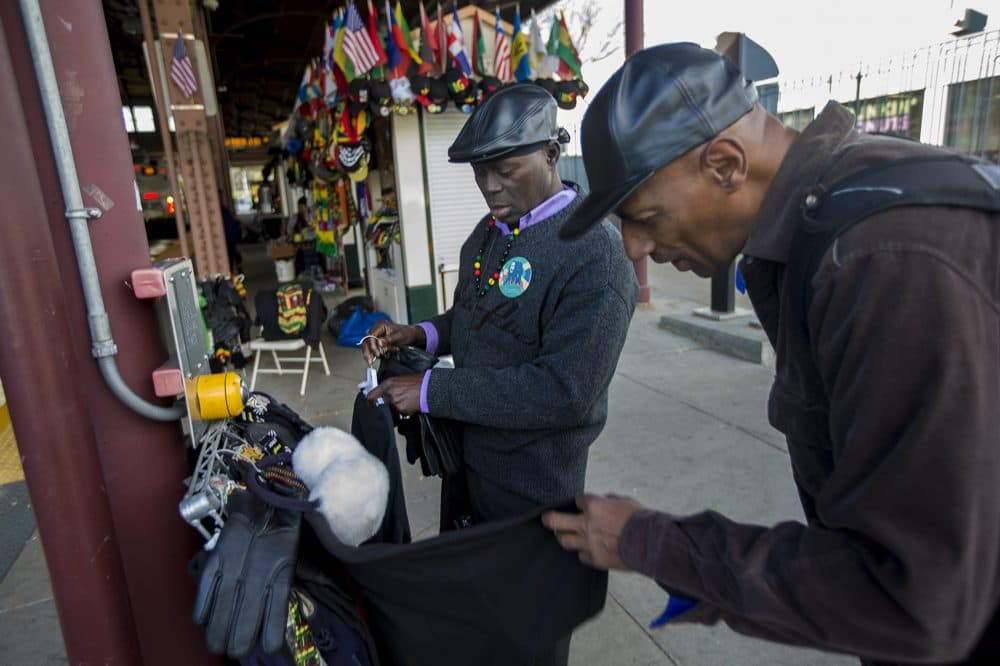Advertisement
Boston's Wide Economic Disparity Plays Key Role In Mayor's Race
Resume
On Tuesday, Bostonians will go to the polls to give Mayor Marty Walsh another four-year term, or to replace him with City Councilor Tito Jackson.
A key part of their debate is how best to respond to the economic inequality that increasingly defines Boston.
"There's one of the biggest income inequality gaps [in Boston] in the whole country,” Jackson said, as he campaigned recently in Roxbury.
Jackson is right about that. A 2016 study from the Brookings Institution found that Boston has the highest rate of income inequality among the country’s largest cities.
Boston also has a dramatic disparity in wealth along racial lines. According to a 2015 report from the Boston Federal Reserve, entitled "The Color of Wealth," white households in the Boston metro area have a median net worth of about a quarter of a million dollars, while black households have a median net worth of just $8. The report also finds that close to 80 percent of white families own a home, while just a third of black families do, which means blacks have much less ability than whites to pass wealth on to their children — perpetuating that racial wealth gap.
Jackson argues this has created two Bostons: one wealthy and predominantly white, the other, poor and mostly nonwhite.
"From where we stand here in Roxbury," Jackson said, "and Back Bay — a mile and a half down the road — there's a 33-year difference in life-expectancy. People live to 91.9 [in Back Bay], 58.9 right here [in Roxbury]."
Walsh recognizes the challenge, but he argues that it goes back generations, which is also true. The causes of the wealth gap are many, but they include discriminatory housing and lending policies of the past.
"That's failed policies by the federal government,” Walsh said in last week’s final debate. “That's failed policies by the state government. That's failed policies by the city of Boston. Since I've been mayor, and before I was mayor, I have never backed away on the question of income inequality and racism in our city of Boston."
But Jackson faults Walsh for policies that he says continue to widen economic disparity, and Jackson's chief complaint is about the high cost of housing. He says under the Walsh administration, too much luxury housing is being built at the expense of affordable housing. He also criticizes the mayor for being too cozy with corporations -- for giving tax incentives to GE instead of investing more in education.
“We have more money than we've ever had -- checks flying out the door to General Electric, a mayor who wanted to do Olympics,” Jackson said. “But he won't write the check, won't show value in the young people who make up 100 percent of the future of the city of Boston."
Walsh rejects that claim, and points to a number of initiatives that are aimed at narrowing the economic divide, including making good on a promise to increase affordable housing.
"We've invested in the last three years over $100 million into affordable housing,” Walsh said at last week’s debate. “And this wasn't being built before. We weren't seeing private developers building moderate-low-income housing in the past, and we're seeing it … today. But we still have more work to do."
Walsh defends giving tax incentives to GE as a good deal for the city, because of what GE will give back.

But Barry Bluestone, an economist at Northeastern University, calls this kind of incentive unnecessary corporate giveaways.
"Generally, Tito's right on this," Bluestone said. "Too often, we just throw lots of money at companies who really don't need the money."
But Bluestone gives Walsh credit for expanding affordable housing and education spending, which he says are two of the most effective ways to level the economic playing field. He also points out that high rates of inequality aren't necessarily evidence of a city on the wrong track. He argues that Boston does a better job than most cities accommodating its poorest residents, thanks to relatively generous state and city rental subsidies, and that growing supply of low-income housing.
"As a result, we’ve been able to retain our very low-income people here,” Bluestone said. “We, of course, have tons of wealthy people here, but statistically, if you have the very rich and the very poor, you're going to come out with a statistic that says inequality is out of control.”
This is evidence of something that is working well in Boston, rather than something the city is doing wrong, according to Bluestone.
On a recent morning in the Haley House Bakery Cafe in Roxbury, opinion was divided as to which candidate would do a better job at closing Boston's economic divide.
Debbie Denton of Roxbury says she supports Walsh because she believes he's built on the progress of former Mayor Thomas Menino.
"I saw a drug-infested street get cleaned up, totally,” Denton said. “[There’s] more police presence. Businesses are coming back to the neighborhood, and property values are going up."

But development and rising property values are good for some, but not everyone. Sitting just a few tables away, Kalamu Kieta, a community organizer and artist from Dorchester, disagreed with Denton, and blamed Walsh for runaway development, which he says makes the divide worse.
"A lot of these developments squeeze people of color more than anyone else,” Kieta said. “To be honest, I never voted for Walsh in the first place.”
Kieta talked about a mother of four he met recently who has rented the same house in Upham's Corner for the past 37 years, but because of rising rents, she will be forced to move.
“That's the kind of thing I don't think Marty Walsh pays any attention to whatsoever,” Kieta said.
The debate about inequality and the tension between neighborhood stability and development has been around Boston for a long time.
“They’re the same issues that Mel King and I talked about when we ran for mayor in 1983," said Ray Flynn, who served as the city’s mayor from 1984 until 1993.
That 1983 race was the last time a white Irish guy (Flynn) ran against an African-American (King). Flynn complains that over the last 20 years, Boston has embraced too much luxury and high-rise development to the detriment of working class neighborhoods, like his own South Boston.
“Everything [in South Boston] is $1.3-million condos,” Flynn said. “If you just open up the doors to all kinds of developments, you're not going to get the balance — and that's the key word — you're not going to get the balance that the city needs."
When asked who he supports in the current race for mayor, Flynn declined to offer a full-throated endorsement of either Walsh or Jackson.
“I’m supporting my son Eddie for Boston City Council,” Flynn said. “But I’m very friendly with Marty Walsh.”
Flynn says he believes Walsh is at least trying to bring that balance back, which would help narrow the economic divide. For his part, Jackson is trying to make the case that there is evidence to suggest that Walsh has not been successful.
This segment aired on November 1, 2017.
